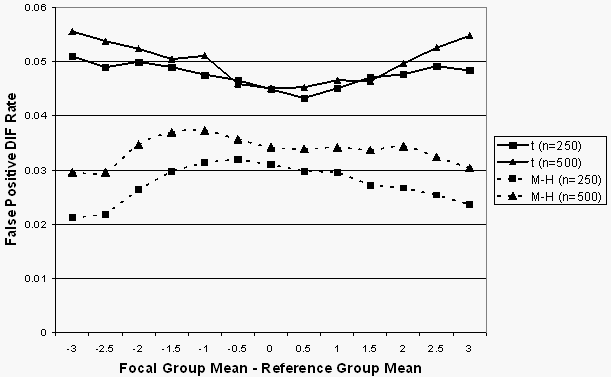
Figure. False Positive DIF Rate by Group Mean Difference and Sample Size.
Differential item functioning (DIF) occurs when an item has a different probability of endorsement for different groups of respondents who are equivalent on the measure. When groups are not equivalent, matching of respondents on ability or other method of controlling for group differences is necessary. Nevertheless, there is evidence that some DIF procedures may result in increased false positive DIF results when groups differ in ability (DeMars, 2010; Li & Stout, 1996). Previous studies have generally focused on the impact of small to moderate (e.g., 0.5 to 1.0 logits) group differences. What effect do larger group differences have on DIF results?
A series of Monte Carlo simulations were performed to answer this question. Dichotomous item responses to a 25-item instrument were simulated according to the Rasch model for two groups of simulees (n = 250 or 500 per group). In each dataset, a common set of item calibrations derived from a uniform random distribution were used for both groups (i.e., no DIF was simulated). Group means for both reference and focal groups ranged from -1.5 to 1.5 logits in increments of 0.5 logits (group standard deviations = 1.0). For each combination of sample size, focal group mean, and reference group mean, 100 datasets were generated. False-positive DIF using both t-test comparisons of item calibrations and the Mantel-Haenszel (M-H) test was based on statistical significance at the .05 level. Simulations were performed using R (version 2.13), the rWinsteps package (version 1.01) and Winsteps (version 3.72.3).
The figure shows the false positive DIF rates for each method by focal group - reference group differences in ability and sample size. Both methods resulted in false positive DIF rates that are generally within the nominal .05 level, with M-H having lower error rates, particularly with absolute group differences = 2 logits. Only with the t-test procedure, when the number of respondents per group equaled 500 and when absolute group differences were = 2.5 logits did the false positive rate exceed 5 percent.
Conclusions: These results suggest that DIF methods commonly used in conjunction with Rasch measurement are robust against large differences in group ability. The Mantel-Haenszel procedure resulted in a lower false positive rate and may be the more appropriate method when group differences and sample sizes are large. A limitation of the analysis is that power in detecting true DIF was not assessed.
Barth Riley
DeMars, C. E. (2010). Type I error inflation for detecting DIF in the presence of impact. Educational and Psychological Measurement, 70(6), 961-972.
Li, H.-H., & Stout, W. F. (1996). A new procedure for detection of crossing DIF. Psychometrika, 61(4), 647-677.

Figure. False Positive DIF Rate by Group Mean Difference and Sample Size.
Considering Large Group Differences in Ability in DIF Analysis, Barth Riley ... Rasch Measurement Transactions, 2011, 251:2, 1326
| Forum | Rasch Measurement Forum to discuss any Rasch-related topic |
Go to Top of Page
Go to index of all Rasch Measurement Transactions
AERA members: Join the Rasch Measurement SIG and receive the printed version of RMT
Some back issues of RMT are available as bound volumes
Subscribe to Journal of Applied Measurement
Go to Institute for Objective Measurement Home Page. The Rasch Measurement SIG (AERA) thanks the Institute for Objective Measurement for inviting the publication of Rasch Measurement Transactions on the Institute's website, www.rasch.org.
| Coming Rasch-related Events | |
|---|---|
| Jan. 16 - Feb. 13, 2025, Fri.-Fri. | On-line workshop: Rasch Measurement - Core Topics (E. Smith, Winsteps), www.statistics.com |
| Apr. 8 - Apr. 11, 2026, Wed.-Sat. | National Council for Measurement in Education - Los Angeles, CA, ncme.org/events/2026-annual-meeting |
| Apr. 8 - Apr. 12, 2026, Wed.-Sun. | American Educational Research Association - Los Angeles, CA, www.aera.net/AERA2026 |
| May. 15 - June 12, 2026, Fri.-Fri. | On-line workshop: Rasch Measurement - Core Topics (E. Smith, Winsteps), www.statistics.com |
| June 19 - July 25, 2026, Fri.-Sat. | On-line workshop: Rasch Measurement - Further Topics (E. Smith, Winsteps), www.statistics.com |
The URL of this page is www.rasch.org/rmt/rmt252d.htm
Website: www.rasch.org/rmt/contents.htm